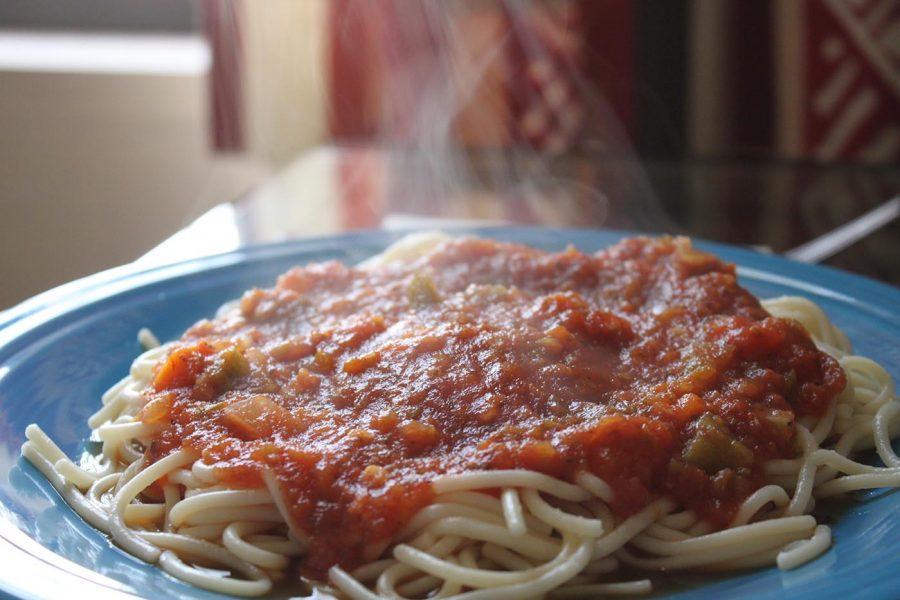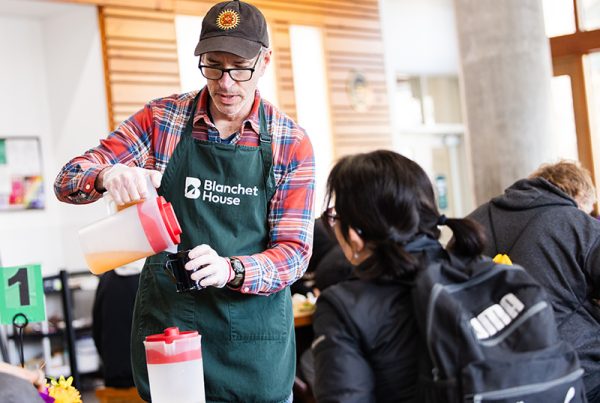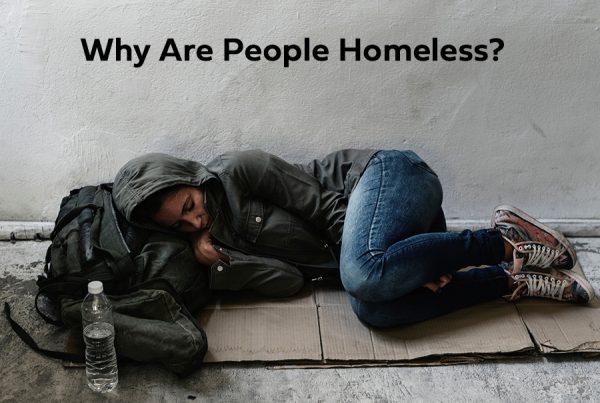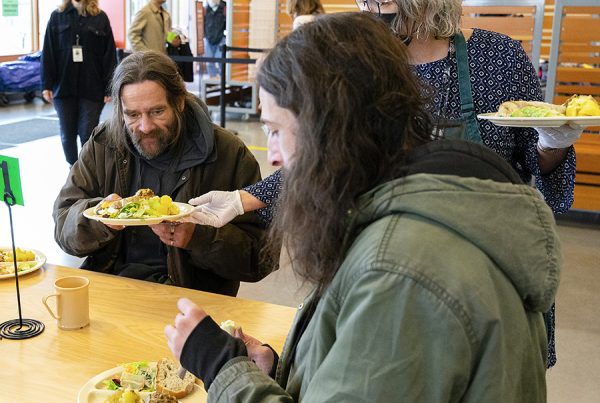If you’re experiencing homelessness, sometimes the only way to eat a hot meal is to visit a charity meal provider because SNAP benefits exclude hot meals
By Alex Marisa
Imagine you’re hungry. You have just enough money to purchase a box of macaroni and cheese from a grocery store but nowhere to cook it. For people enrolled in the Supplemental Nutrition Assistance Program (SNAP) while experiencing homelessness, this is a daily predicament.
SNAP, also called EBT, food stamps or a food card, is a federal program that provides money to low-income people to buy food. But many people don’t realize that there are limits to which types of food you can buy. Prepared foods like sandwiches, items from a hot bar, or meals from restaurants are not allowed under the program. This puts people unable to cook because of disabilities or homelessness at a huge disadvantage.
If you don’t have the ability to cook or safely store food, then your nutrition is limited to items that can be eaten without cooking.
“People don’t have a refrigerator or stove in their tent.” –Jennifer Coon
“People don’t have a refrigerator or stove in their tent,” says Jennifer Coon, who once was homeless and is now a Peer Support Specialist at Blanchet House in Portland. “They can’t even buy a gallon of milk for cereal because it is going to go bad. They are pretty much forced to shop at a convenience store. Which is so expensive and not nutritious.”
According to Jake Sunderland, a spokesperson with the Oregon Department of Human Services, “SNAP benefits vary due to individual and household circumstances. In 2019 the average monthly SNAP benefit per household member was $133.”
The average person would need to limit their spending to only $4-$5 a day to make the monthly benefits last. There is a very low chance that a SNAP receiver unable to cook is eating three nutritious meals a day.
Think of all of the food you eat in a day that first needed to be heated. Even those inexpensive packets of ramen noodles or a box of macaroni need boiling water to be prepared.
SNAP Benefits Exclude Hot Meals
One of the only places for people without the ability to cook to go for a nutritious hot meal is an aid organization most aren’t funded by tax dollars. In Portland, there are quite a few to choose from but they are open on different days, and hours, and you might need to spend money to take a bus to get to one.

A volunteer serves a hot meal at Blanchet House of Hospitality in Portland.
Blanchet House in Old Town is the only nonprofit meal provider that offers hot meals three times a day, six days a week. There are no requirements to receive a meal there. No need to show an ID card.
“When I was homeless many years ago the only hot meal I had each day was at Blanchet House,” says Michael Knight.
Civil Eats reported in 2020 that three states are moving to enact a Restaurant Meals Program that will allow people to buy prepared meals with SNAP benefits. A few states have passed a Hot Foods Act but have not yet received federal approval.
“Federal rules prevent SNAP from being used to purchase foods that are hot at purchase or that are prepared on-site and require no additional preparation for immediate consumption,” says Sunderland.
Even if someone wanted to attempt to eat a more nutritionally beneficial diet, they cannot keep food like fruits, vegetables, or milk from quickly spoiling without refrigeration. And to make SNAP dollars go far, most people would be inclined to purchase dry goods such as rice or pasta that are slow to perish. Without electricity, you cannot prepare these foods.
No Kitchen, No Hot Meals with SNAP Benefits
Many of the people that charity kitchens like Blanchet House serve do not know where their next meal will come from.
And that is not the only concern. Sometimes when people do have access to hot food, poor dental health can make eating painful or impossible.
“A lot of people in active addiction and homelessness have rotting teeth. That’s why we can’t serve corn on the cob. We serve rice and pasta that are soft and easy to eat,” says Coon.
It’s important that accommodations are made to ensure people are getting adequate nutrition and not going hungry.
“Because they are people too. It’s somebody’s mom, dad, brother. And everyone has a story,” says Coon when asked why people should care. “When we’re super hungry the last thing you want is to struggle to eat.”
Sutherland suggests people who don’t have a kitchen to prepare foods purchased with SNAP benefits search the internet for local hot meal providers like Blanchet House.
“If you have access to the internet, you can visit foodfinder.oregonfoodbank.org,” he says. “If you have access to a phone, you can call or text 211.”
Every person deserves to eat hot, nutritious meals and for many people in Portland, this would not be possible without charity food providers and mutual aid groups. Food is central to human life on this planet and therefore should not be the cause of a daily struggle for anybody.
Until the SNAP rules change, you can help by donating to your local charity kitchen or mutual aid group. They will help people in need get hot meals.


















